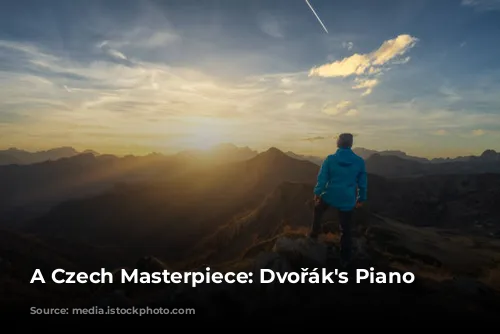Antonín Dvořák, a renowned Czech composer, crafted his Piano Concerto in G minor, Op. 33, in 1876. Despite his genius, Dvořák was primarily known within his native Prague at the time. He earned a humble living as an organist and piano teacher. Karel Slavkovský, a dedicated champion of Czech music, gave the concerto its world premiere in 1878 at the Žofín Palace in Prague. The piece was performed again two years later, and soon after, Dvořák began receiving offers from prestigious publishers. Julius Hainauer, a publisher from Breslau, released the concerto in 1883.
Dvořák, a meticulous artist, revised the score extensively before publication, ensuring its polished sound. His concerto was truly ahead of its time, which, unfortunately, had negative consequences. Some critics, a small but vocal minority, found fault with the concerto’s unconventional approach, while others were blinded by their prejudice against Czech nationalism. Dvořák, however, remained unfazed by their criticisms. After a successful concert in Berlin in 1884, he humorously wrote to Anna Grosser, a renowned pianist, “All this criticism overflowing with ridicule, hatred, and bile (more like an execution) provides me with plenty of amusement and entertainment. Things keep getting crazier, but those gentlemen in Berlin still will not stop me from taking flight!”

A Concerto’s Legacy: From Neglect to Revival
Despite the critics’ attempts to hold Dvořák down, his Piano Concerto continued to be performed throughout the following years, though not as frequently as other masterpieces by the composer. Vilém Kurz, a renowned Prague pianist and teacher, made an arrangement of the solo part in the early 20th century, fifteen years after Dvořák’s death. His students and other pianists embraced this arrangement for many years, even after such arrangements fell out of favor. In the latter half of the 20th century, there was a growing movement towards more faithful interpretations of composers’ original scores.
András Schiff, the renowned pianist performing the concerto in this concert, has chosen to play Dvořák’s original version. Many pianists have begun to follow suit in recent decades, yet the concerto still receives far less attention than other concertos. Sviatoslav Richter, a legendary pianist who performed only Dvořák’s original version, offers a clue to this enduring mystery. Despite his technical prowess, Richter focused on understanding the heart of the music. In his diary entry from November 1977, he wrote: “I recall how long it took me to learn this [Dvořák’s] concerto (nearly three years), while I learned Bartók’s Second Piano Concerto in just two months without having any special difficulties.”
Richter’s words hint at the concerto’s unique character: a work of extraordinary brilliance that demands time and dedication to truly grasp. This may be why Dvořák’s Piano Concerto, despite its exceptional qualities, remains a hidden gem, waiting to be rediscovered by audiences and performers alike.













